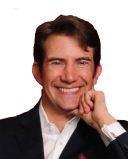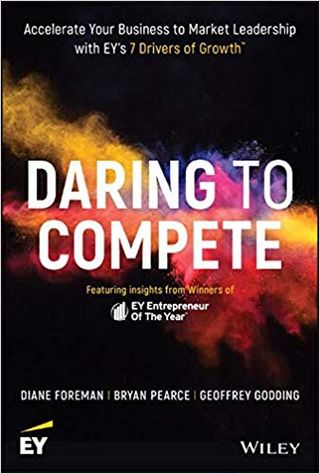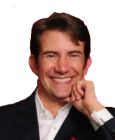
Resilience
Daring to Compete: The DNA of an Entrepreneur
A new book researches the traits of elite entrepreneurs.
Posted May 7, 2019
Entrepreneurs are a special breed. They are the disruptive forces constantly challenging the status quo and often defining our futures for us. The media has an endless fascination with trying to understand who they are and how to teach us to be more like them. At any one time, you can find thousands of articles, blogs, profiles, and books attempting to breakdown the backgrounds, traits, and habits of these unique disruptors of society. Unfortunately, these attempts mostly fall short due to the top-line superficial nature of media today.

The newly released book Daring to Compete takes a stab at cracking that elusive entrepreneurial code by taking a deeper dive. Based on data collected from thousands of interviews over the course of the more than 30-year span of the acclaimed EY Entrepreneur of The Year program, the authors uncovered some fascinating similarities among the world’s elite entrepreneurs. Although these similarities appear quite simple at first glance, there is a lot that goes on below the surface. I had the opportunity to speak with Bryan Pearce, one of the co-authors of the book and EY Global Leader for Entrepreneurship.
Any conversation about leadership and success typically involves the age-old nature vs. nurture debate. Pearce believes it is a bit of both. He shared that entrepreneurs are born with a spark (or some natural attribute), but also fan (or nurture) that spark as they grow. In the book, the authors outline eight nurtured attributes, three of which I discussed with Pearce: drive, resilience, and agility.
The Drive to Succeed: A lot of people have drive, it’s what they do with that drive that matters. In the book, the authors point out that drive comes from many places and some harness their drive more effectively than others. “I think if you look at the stories of the entrepreneurs we interviewed” notes Pearce, “drive - in part - comes from the confidence of building on ‘small successes’ and the desire to then tackle bigger opportunities - whether it was Jim Nixon and Lonnie Moulder successfully disassembling motorbikes and successfully putting them back together or Murad Al-Katib selling bubble gum before selling hundreds of millions in pulse crops.”
Drive is clearly something that is rooted in your personality and manifests early on. The challenge is effectively nurturing that drive through the pursuit of small and progressive wins. A common mistake many make is seeing drive as that ability to catapult oneself from obscurity to success with one bold move. Drive that can’t be sustained really isn’t drive because achieving success is about the long game. Fits and starts won’t get you anywhere. On the flip side, Pearce points out that, “there are also lots of people that really don't have drive and they will not, and should not, become entrepreneurs!”
The Resilience to Fail Forward: In most societies, and certainly in the US, failure is a negative term. However, these entrepreneurs seem to approach getting past failure differently. They have a certain resilience that appears to inoculate them from the emotional turmoil of failure. Pearce points out that in his experiences, “the people who get past failure effectively are those that see it as a learning experience and truly learn from it - I think one of the favorite quotes we included in the book is ‘Sometimes you win - sometimes you learn!’” The entrepreneurs Pearce and his co-authors interviewed had clearly learned from their failures and were determined not to make the same mistake again. He points out that, “they were not paralyzed by failure - in some cases they viewed it as an environmental factor beyond their control that led to the failure.” As examples he points to the downfall of DanPer founder Rosario Bazan's first business due to the poor economic conditions at the time in Peru and a product recall Manny Stul of Moose Toys faced. They had major setbacks, but they learned from them and found ways to make sure they wouldn’t find themselves in those situations again.
Setbacks are part of the learning process. The difference between success and failure is understanding how to take your failures forward. Suffering a setback is one thing, but allowing that setback to perpetuate your suffering is entirely another. More simply put, it’s one thing to take a hit and entirely another to let it keep you down.
The Agility to Rapidly Adapt: Pearce believes that "agility and hunger for learning are closely related.” He shared that the entrepreneurs they interviewed were agile because they are curious and are able to quickly come up with unique alternatives to problems others have struggled to solve. They rarely get fixated on one way of doing things, but rather focus on options and continue to pivot until they find another way. “As I have often said, put a wall in front of a true entrepreneur and they will find a way to go through, over, under or around it - they won't be paralyzed by the fact that there appears to be a wall in front of them.”
Curiosity can be difficult to train and most of us have a psychological bias towards using objects for what they are primarily designed for as opposed to what they could alternatively be used for. In other words, I see a hammer and my first thought is to pound a nail. This phenomenon is referred to as functional fixedness. Due to their curious nature entrepreneurs tend to see a wide variety of options where the rest of us see limitations. Although not easy, challenging our functional fixedness to foster open-mindedness is one thing that many of us have within our power to nurture, but it will take drive and resilience to make it happen.

